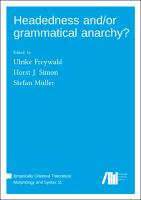Headedness and/or grammatical anarchy?
Contributor(s)
Freywald, Ulrike (editor)
Simon, Horst J. (editor)
Müller, Stefan (editor)
Collection
Knowledge Unlatched (KU)Language
EnglishAbstract
In most grammatical models, hierarchical structuring and dependencies are considered as central features of grammatical structures, an idea which is usually captured by the notion of “head” or “headedness”. While in most models, this notion is more or less taken for granted, there is still much disagreement as to the precise properties of grammatical heads and the theoretical implications that arise of these properties. Moreover, there are quite a few linguistic structures that pose considerable challenges to the notion of “headedness”. Linking to the seminal discussions led in Zwicky (1985) and Corbett, Fraser, & Mc-Glashan (1993), this volume intends to look more closely upon phenomena that are considered problematic for an analysis in terms of grammatical heads. The aim of this book is to approach the concept of “headedness” from its margins. Thus, central questions of the volume relate to the nature of heads and the distinction between headed and non-headed structures, to the process of gaining and losing head status, and to the thought-provoking question as to whether grammar theory could do without heads at all. The contributions in this volume provide new empirical findings bearing on phenomena that challenge the conception of grammatical heads and/or discuss the notion of head/headedness and its consequences for grammatical theory in a more abstract way. The collected papers view the topic from diverse theoretical perspectives (among others HPSG, Generative Syntax, Optimality Theory) and different empirical angles, covering typological and corpus-linguistic accounts, with a focus on data from German.
Keywords
Language Arts & Disciplines; LinguisticsDOI
10.5281/zenodo.6973523ISBN
9783985540501, 9783961103928, 9783961103928Publisher
Language Science PressPublisher website
https://langsci-press.org/Publication date and place
2022Grantor
Imprint
Language Science PressClassification
Linguistics


 Download
Download